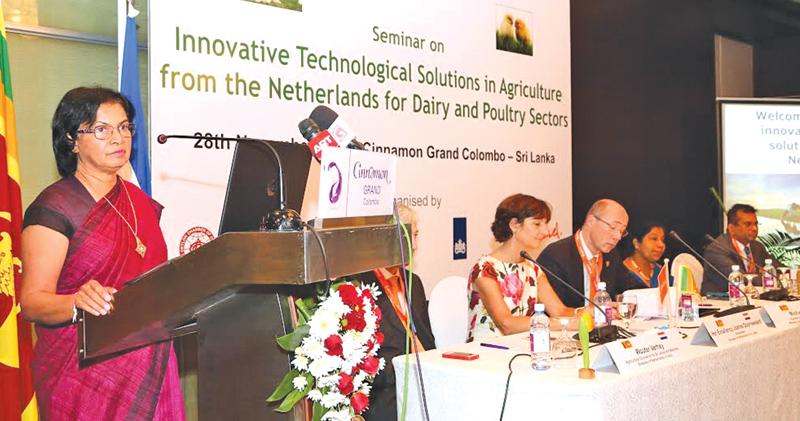
Sri Lanka and the Netherlands should continue to foster their economic ties at the government as well as the private sector level for a comprehensive engagement to market both our nations together, as partners in progress.
“We wish to reiterate the importance of the bilateral relationship between Netherlands and Sri Lanka, which has stood the test of time amidst changing international circumstances and evolution of domestic political situations, as testimony of a solid and deep friendship between the two countries,” said Chief Executive Officer of the Ceylon Chamber of Commerce, Dhara Wijayatilake at a seminar on ‘Innovative Technological Solutions in Agriculture from the Netherlands’
It jointly organised by the Netherlands Embassy and the Netherlands Export Combination with the Ceylon Chamber of Commerce in Colombo.
Trade volumes between the two countries have increased rapidly during last couple of years. The Dutch government has extended its support to improve the dairy and poultry sectors in Sri Lanka. The dairy industry has potential to contribute considerably to Sri Lanka’s economic development. A traditional industry surviving thousands of years, milk production also plays an important role in alleviating nutritional poverty in all age groups. And it is a source of extensive employment opportunities, she said.
“Given the current levels of malnutrition, particularly among pre-school children and pregnant mothers, milk production is an important activity for improving the nutrition situation.Milk is currently sold through a combination of private and public organizations working in tandem with each other.
“The dairy sector is regarded as the priority sector in livestock development for public investment. Promoting a liquid milk market, expanded to the regions outside the traditional centres of milk consumption, is a precondition for increasing the competitiveness of domestic milk.
“The policy goal in developing the livestock sector is yet to achieve sustained and equitable economic and social benefits to livestock farmers while increasing the supply of domestic livestock produce at competitive prices for consumers,” Wijayatilake said.
She outlined the importance of focusing on the import policy and fiscal policy on dairy products to provide a conducive environment for the domestic dairy industry, with market forces governing the pricing of domestic milk.
“Besides, from a technical perspective, dairy farmers and processers can be empowered to further participate in the value chain of dairy products by institutional improvements for delivery of veterinarian care services and animal health management; stronger extension services and human capital development and value addition at the village level.“It is also important to develop the feed resource base including pasture and other natural forages as well as coarse grains, agricultural waste and by-products is of paramount importance for Sri Lanka to further develop the dairy industry,” she added.
Poultry industry in Sri Lanka has shown a phenomenal growth over the recent past. As a result, poultry products have become essential food items in Sri Lankan menus. Demand of chicken meat and eggs have been fulfilled by local production. Searching for avenues to reduce cost of production and producing of quality product at competitive prices will be a necessity to win the export market. As Sri Lanka is now gearing itself to leap forward in economic integration with the rest of the world, the Netherlands would be an important partner in our endeavours, she said.
